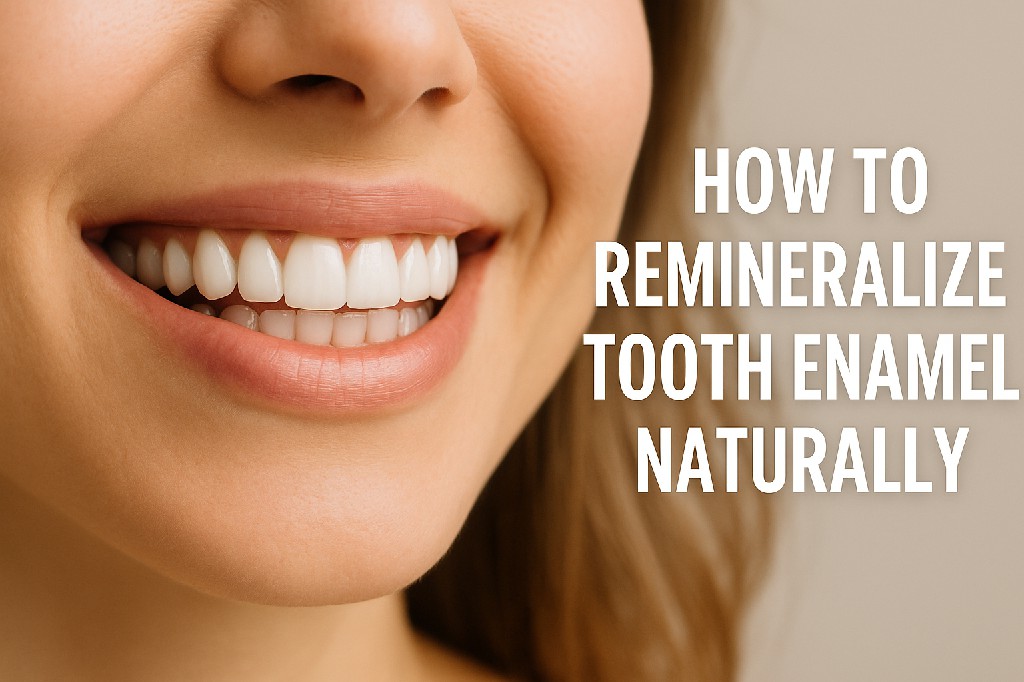How to Remineralize Tooth Enamel Naturally
Tooth enamel is the hardest substance in the human body, but it isn’t invincible. Every day, acids from foods and bacteria attack your enamel, potentially leading to tooth decay. However, the good news is that you can take proactive steps to remineralize tooth enamel naturally and even reverse early signs of cavities. This article explains how, using science-backed strategies and natural remedies.

What Is Tooth Enamel and Why It Matters
Tooth enamel is the thin, outer layer of your teeth that protects them from daily wear and tear. It shields the sensitive inner layers from heat, cold, acids, and bacteria. Unfortunately, once enamel wears away, it doesn’t regenerate like bone tissue. But there’s hope: while you can’t regrow enamel, you can remineralize tooth enamel naturally, which means restoring lost minerals and strengthening your teeth.
How Demineralization Leads to Cavities
Before we dive into how to remineralize tooth enamel naturally, it’s important to understand demineralization. This is the process where acids from sugary foods and plaque-producing bacteria strip minerals, like calcium and phosphate, from your enamel. If left untreated, this leads to soft spots, then decay, and eventually cavities.
Fortunately, early enamel erosion is reversible. By making some targeted changes, you can stop decay in its tracks and help your enamel become strong again.
Signs You Need to Remineralize Tooth Enamel
You might not always feel when your enamel is weakening, but some early signs include:
-
Sensitivity to hot or cold foods
-
White spots on teeth
-
Dull or discolored enamel
-
Rough edges or surface texture
If you experience any of these, it’s time to act and remineralize tooth enamel naturally to avoid further damage.
What Remineralization Actually Does
Remineralization doesn’t rebuild lost enamel, but it restores essential minerals, such as calcium, phosphate, and fluoride, into the enamel structure. This strengthens the enamel, reduces sensitivity, and stops early decay from progressing.
Most importantly, remineralization can occur naturally with the right nutrients, habits, and lifestyle changes. Let’s explore them now.
Top Nutrients That Remineralize Tooth Enamel Naturally
1. Calcium-Rich Foods Support Enamel Health
Calcium is the foundation of strong teeth. Eating foods like leafy greens, almonds, dairy products, and sardines helps replace lost minerals. Additionally, calcium phosphate binds to the enamel and can remineralize tooth enamel naturally over time.
2. Vitamin D Boosts Calcium Absorption
Even with enough calcium, your body can’t use it without vitamin D. This vitamin enhances calcium absorption in the gut, which means your teeth benefit more. Natural sunlight, fatty fish, egg yolks, or supplements can help you reach optimal vitamin D levels.
3. Phosphorus Reinforces Tooth Enamel
Phosphorus works in tandem with calcium to restore enamel. Foods like eggs, fish, meat, dairy, and whole grains are excellent sources that support your goal to remineralize tooth enamel naturally.
4. Vitamin K2 Guides Minerals Into Enamel
While not often discussed, vitamin K2 helps direct calcium to bones and teeth instead of soft tissues. Fermented foods like natto, cheese, and grass-fed animal products are great natural sources.
Best Oral Habits to Remineralize Tooth Enamel Naturally
1. Use Fluoride or Hydroxyapatite Toothpaste
Both fluoride and hydroxyapatite (a natural mineral similar to enamel) can bind to your teeth and fill microscopic holes. Choosing toothpaste with these ingredients helps you remineralize tooth enamel naturally and reduce sensitivity.
2. Brush Gently With a Soft Toothbrush
Brushing too hard or using stiff bristles can erode enamel. Instead, brush twice daily with a soft-bristled brush and gentle, circular motions to prevent further damage while supporting remineralization.
3. Avoid Acidic Foods and Drinks
Highly acidic foods like soda, citrus fruits, and vinegar can strip away enamel. While occasional consumption is okay, it’s important to rinse your mouth with water afterward. You can also use a straw when drinking acidic beverages to minimize direct contact with your teeth.
Natural Remedies That Help Remineralize Tooth Enamel
1. Oil Pulling Reduces Acidic Bacteria
This ancient Ayurvedic practice involves swishing oil (typically coconut oil) in your mouth for 10–20 minutes. It helps reduce harmful bacteria and plaque, making it easier for your body to remineralize tooth enamel naturally.
2. Baking Soda Balances Oral pH
Baking soda is alkaline, which helps neutralize acids in the mouth. Brushing with a small amount once or twice a week can prevent further demineralization and support enamel health. However, be gentle, baking soda can be abrasive.
3. Green Tea Contains Natural Fluoride
Green tea not only provides antioxidants but also contains trace fluoride, which helps you remineralize tooth enamel naturally. Drinking it regularly, without sugar, can support overall oral health.
What to Avoid If You Want to Remineralize Tooth Enamel Naturally
While good habits are essential, it’s equally important to stop the bad ones:
-
Don’t brush immediately after eating: Acids soften enamel, so wait at least 30 minutes.
-
Avoid mouthwashes with alcohol: These can dry your mouth and harm beneficial bacteria.
-
Say no to sugary snacks and drinks: Frequent sugar intake fuels acid-producing bacteria.
Avoiding these mistakes helps protect your enamel and allows your body the time it needs to naturally rebuild lost minerals.
How Saliva Helps Remineralize Tooth Enamel Naturally
Saliva is your mouth’s natural defense system. It contains calcium and phosphate, which are key ingredients for remineralization. Staying hydrated, chewing sugar-free gum, and eating crunchy vegetables can stimulate saliva production. That’s why it’s essential to keep your mouth moist if you want to remineralize tooth enamel naturally.
When to See a Dentist
While natural methods are powerful, they’re not a replacement for professional dental care. If your enamel loss is advanced or you already have cavities, a dentist can offer solutions like sealants, fluoride treatments, or even remineralizing varnishes.
Regular check-ups every six months help you catch early problems and ensure that your efforts to remineralize tooth enamel naturally are working.
A Daily Routine to Remineralize Tooth Enamel Naturally
To make your journey easier, here’s a simple daily plan you can follow:
-
Morning:
-
Brush with fluoride or hydroxyapatite toothpaste
-
Eat a calcium- and protein-rich breakfast
-
Take vitamin D and K2 supplements if needed
-
-
Midday:
-
Drink green tea or water
-
Avoid snacking on sugary or acidic foods
-
Chew sugar-free gum to boost saliva
-
-
Evening:
-
Practice oil pulling before brushing
-
Brush gently again and floss
-
Use a remineralizing mouth rinse (alcohol-free)
-
Stick to this routine consistently and you’ll support your goal to remineralize tooth enamel naturally in a sustainable and safe way.
Conclusion
Although enamel loss was once considered permanent, recent studies and natural approaches have shown promising results in slowing down or even reversing early damage. By improving your diet, adopting consistent oral hygiene practices, and incorporating specific natural remedies, you can strengthen your teeth and prevent further deterioration. With dedication and the right routine, achieving a healthier, brighter smile is entirely within reach.
